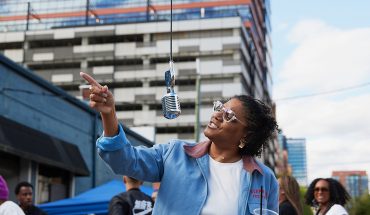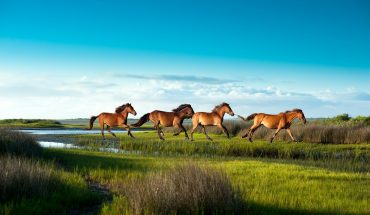A CAROLINA SUMMER
by Mimi Montgomery
photograph by Greg Montgomery
“We really are spoiled,” one of my North Carolina friends says. “The ancient curves of the Blue Ridge to the west, the blue-green rise and fall of the Atlantic to the east. How could you go wrong?”
Summer in North Carolina is, without question, wonderful. Sure, fall is lovely, full of football games, Indian summer days, and trips to the farmers market. Winter is a breeze compared to what our friends up North have to deal with. And spring, with its fragile fullness and budding green, is a hint at the best to come.
Because summer beats them all. Whenever I tell out-of-staters I’m from North Carolina, they’re always excited to tell me about the time their grandmother rented a beach house in the Outer Banks, or they went to Asheville over Labor Day. We really are spoiled. The ancient curves of the Blue Ridge to the west, the blue-green rise and fall of the Atlantic to the east. How could you go wrong?
Of course, there are some heretics that maintain the beaches of that other Carolina are better. On this assertion, I politely decline to comment. I will say, however, that I spent far too many hours of my college career watching people eat fried turkey legs and dance in nightclub cages on the cheery shores of Myrtle Beach. In the words of Forrest Gump: “That’s all I have to say about that.”
Living in Raleigh, North Carolina, our state’s beaches become a second living room during the summer. On Friday afternoons, you can dip out of work a bit early and be on the beach in time for a cocktail before dinner. I’ve made that drive on I-40 so many times it’s like a second heartbeat – the peach stands and boiled-peanut cardboard signs, the terrain growing flatter and flatter and more swamp-like with tall pines; that first breath of salt breeze curling in toward you. It’s the best welcome of all.
My grandparents have owned a home in Wrightsville Beach since before I was alive, so I’m a bit biased. We have pictures of my grandfather holding me there as a newborn, and I learned how to ride my bike on sizzling black asphalt along Wrightsville marshes that rose and fell with the tide.
My grandmother passed away three years ago, but nothing in the house has changed. The red and white couch is still by the bay window, bleached from years of sun; the rug in the living room hides a dark brown stain where I spilled Cheerwine as a kid; the plastic crab figurines I played with still abound with nautical enthusiasm (much to my mother’s chagrin).
Everything I remember from my life at the beach is tinged with a bright fondness. My dad, dork emeritus, was the Frank Lloyd Wright of sandcastle architecture. While other dads hauled out flimsy plastic buckets and good-naturedly packed sand into them, my dad believed each sand construction was his very own Fallingwater.
He brought an actual metal shovel and wagon to the beach, and probably would have rented a backhoe if my mother had allowed it. He dug holes wide enough to fit a small cocktail party; holes that veered precipitously down to the earth’s molten core. Beside these holes, he made sandcastles that rivaled the Mall of America. No grain of sand, shell, or bit of sea grass within a five-mile radius was safe. He used everything.
None of this stopped even after my brother and I became lazy, angsty teenagers, preferring to ride our bikes into town rather than act as his work crew.
But his imagination didn’t end there. He knew that tidal pools can hold a hypnotic captivation over little kids, and he used this to his advantage. A nefarious creature called “The Lizard Lazala” slithered along shallow tidal pools and feasted on the legs of small children, according to him. Coincidentally, the Lizard Lazala looked a lot like a middle-aged man in oversized goggles floundering about in two-feet-deep puddles. Who could have foreseen that his goggly eyes would mistake a neighboring group of kids for my brother and me? Their parents, I’m sure, were delighted to witness a complete stranger attempting to bite their children’s legs underwater, coming up for air to scream: “Lizard Lazala!”
Piratical
Don’t even get me started on the pirates. Nothing captivated my brother and me more than stories of Edward Teach and Blackbeard. To my six-year-old self (and let’s be honest, even my current 25-year-old self), piracy is the ultimate dream job. You get to be outside, on the water all day, you don’t have to bathe, and no one makes you do boring stuff like fill out W-9 forms for your gold doubloons or pay insurance on your ship. I mean, there’s the whole scurvy and marauding outlaw thing, but nothing’s perfect, right?
Our love for those swashbucklers who sailed up and down the North Carolina coast ran deep: Our parents took us to Ocracoke one summer and we got to stay at the Blackbeard Inn, which was basically our version of nirvana. We spent the entire trip convinced that any bearded dude we passed was somehow Blackbeard’s ghost, walking unrecognized among modern-day mortals.
Our dad and our uncle also used to take us to what they called “pirate camp,” which I have only recently realized wasn’t an actual, registered summer camp, but rather an excuse for the guys to escape the house and drink. “Pirate camp” was held multiple times a week at a pirate-themed bar on Wrightsville, which had dark wood paneling, pirate flags, and a ring-hook game. I’m a little uncertain as to how they managed to smuggle a herd of six-year-olds into a bar, but it was awesome. Our dads would drink beer and hang out, and my cousins and I would get to order unlimited cherry Cokes, french fries, and play whatever we wanted on the jukebox.
I miss pirate camp. I miss the days when my family would pack up and move to the beach for three weeks, my mom holding me down to dump a bucket of sunscreen over my head as I wriggled and screamed. Life has gotten a bit busier, filled with obligations and meetings and grown-up things, but in so many ways, I still feel like that kid with the pudgy belly and saggy bathing suit at the beach.
Maybe that’s why I’m so drawn to the ocean. It has a way of simplifying things. I never feel more myself than when I’m by the water, when I can be reminded of how small and finite my body is. The ocean is simultaneously unknowable and familiar; vast and intimate. Even when I’m far away from North Carolina, from the coast that’s been home above anywhere else, it’s still comforting to know it’s there waiting. Just a drive away, down those North Carolina roads that wind through fields of green tobacco and sleepy little towns, stretching out toward you from a horizon that’s always there, just out of sight.




